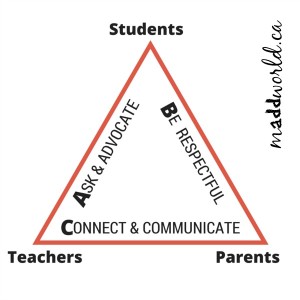Many parents feel they must steel themselves to get through the ordeal of report cards and parent-teacher conferences that are just around the corner, but it doesn’t have to be so.
Parents, teachers, and often students meet to share information; review expectations, grades, and policies; discuss social and academic participation; and discuss your child’s progress. Learning the basic ABCs of collaborative parent-teacher conferences will help you, your child, and teacher work as a team to ensure your child’s success.
ASK and ADVOCATE
Pair statements with questions to engage. No one likes to be told what to do. Engage your child and teacher so they are more likely to participate and follow through with suggestions. The same questions can easily be changed to address each team person.
- Include both in conversation: What do you think is your / your child’s area of greatest success or challenge? Do you agree? What can we do to support growth in this area?
- Don’t assume they are the same at school and at home: If at home, your child struggles with staying on task. Is that also a problem at school? What do you use as strategies in the classroom? Does it help? Is it working? What do you need?
- Broad questions are relevant: Seek feedback on child including their strengths, interests, and challenges to greater inform your own understanding. Are there potential issues at home or school that are interfering with success at school? Economic struggles, family illness or conflict, social struggles, conflict with friends?
BE RESPECTFUL and BE ENGAGED
Developing respectful relationships and building a team approach to learning requires attention to the golden rule: “Treat others as you wish to be treated.” There are no adversaries here. Everyone in this partnership is working toward success for the student.
- Listen. Take each voice into account and encourage all team members to participate in decision making. Consider students’ interests and preferred ways of learning to provide differentiated opportunities for learning.
- Be fair and be open. Report and discuss student progress – positive and negative – with empathy, honesty and objectivity. Model a no-blame approach when raising concerns.
- Preserve dignity. Don’t declare negative opinions, concerns, or evaluations in front of others – even if you deem them valid or constructive. Public criticism risks damaging the trust and cooperation between all partners. This is especially potentially harmful for students requiring additional support or facing special needs who may already feel self-conscious.
- Do your part. It takes time, coordination of effort, and ongoing commitment from all members – each is accountable. Teachers use the curriculum expertly through pedagogies that provide learning opportunities for all students. Students must strive to make progress and actively participate in their learning. Parents are important primary caregivers and support learning in and outside the classroom – that also includes regular review of assigned work, due dates, and grades.
- Encourage. Use this information gathering to connect with, motivate, and provide learning experiences that engage and excite the student. Encourage students to persist with their best effort despite challenges and obstacles.
CONNECT and COMMUNICATE
Acknowledge efforts of both team members. There is always common ground to find, because you are on the same side. Praise specific effort rather judge achievement. Find a way to communicate that you understand their job is hard and important; that you notice and appreciate their efforts. Isn’t that what we all want to hear?
- Praise: “I really like your idea of using [theatre games] in the classroom to support learning – I bet that works well for a lot of kids! Is there a way to build on your method of [integrating experiential learning methods] to be more inclusive of [introverted kids] such as [building props rather than performing]?
- Acknowledge: “I noticed that you worked really hard on [that thing] you did – I especially like [whatever] about it. What did you like? Do you think it was effective? How can we integrate/change that method to be even more successful?”
- Prepare positive statements in case another golden rule – “If you don’t have anything nice to say” – renders you speechless.
- Continue to build a strong relationship. Utilize multiple opportunities for meaningful contact and feedback between home and school. Reach out before or after the meeting – in person, via email, or social media – with thoughtful reflections that add to the discussion. Offer something unexpected like a note or a homemade treat – even better if it comes from the child!
It really can be as easy to work together at parent-teacher conferences as learning your ABCs – including being mindful of our P’s and Q’s.
Together, let’s make this the best year yet for our students.
Also struggling to advocate for a child with ADHD? Read ADHD Awareness: Tips for Building School Communication
Is your child anxious? Here’s 7 Tips to Curb Anxiety in Children and Teens











